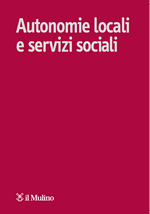“Empirical analyses and critical perspectives on the interaction between financialization and wellbeing/welfare” – Call for abstracts
Autonomie Locali e Servizi Sociali
Quarterly Journal for Studies and Research on Welfare
Call for abstracts
Rescued by Finance?
Empirical analyses and critical perspectives on the interaction between financialization and wellbeing/welfare
Special Issue n. 2/2018
Guest Editors Davide Caselli and Joselle Dagnes
Deadline: 15.02.2018
We invite proposals for contributions focused on the relationship between social policies and the processes of financialization.
In the context of the international economic crisis and Austerity policies, financial players and methods are indeed gaining increasing relevance in ordinary people’s daily life as well as in Welfare policy. Furthermore, this process shows a strong variegation in the different national and local welfare systems and in the different policy sectors, requiring accurate and groundbreaking analyses. More specifically, the literature highlights two dynamics:
- The financialization of well-being: the increasing resort by individuals and families to non-public forms of insurance involving finance in order to guarantee their present or future living conditions – e.g. supplementary pension, health insurance policies, debt to cope with healthcare and care services costs. Other cases involve education, e.g. student loans, and housing, e.g. mortgages and residential leasing schemes;
- The financialization of welfare: the increasing involvement of financial actors in planning and financing social policy interventions. With different intensity and development, these trends are observed in the areas of pensions (e.g. pension funds, financial advances for pensions); real estate (e.g. real estate funds for social housing); community services (e.g. philanthropic grants, social impact investing, social impact bonds).
These emergent and complex phenomena are strictly connected with the inequality structure. In fact, both can be presented as social innovations providing new solutions to old problems, i.e. democratisation of the access to loans on the one hand and new win-win dynamics on the other hand. But they also risk to exacerbate existing inequalities and create new areas of marginality, i.e. persistence of high entry barriers and segmentation in the access to credit on the one hand and loss of individual rights – or even overcoming the culture of social rights – on the other hand.
Moreover, these processes deeply affect social workers, partially redefining ways and contents of their work and their relation with citizens, and service users in particular (e.g. activating spending and saving courses or promoting individualized financial activities and products). These processes raise important issues also with regard to the possibility of voice by the operators in the construction of new policies and in the definition of their daily practice.
We encourage proposals on the following topics inter alia:
- Case-studies focusing on the contamination between well-being/welfare and finance, and its impact on the inequality structure;
- Case-studies focusing on (even partial) experimentations of these models, and analysis of the technical (legislative, financial) tools involved;
- Public regulation of the phenomenon, looking at the role of the State as facilitator or as obstacle;
- New actors which entered the field of welfare through financialization (financiers, service providers, consultants, technicians) and the relationship between them and “traditional” welfare actors;
- Impact of financialization processes in the planning and design of services and/or in the daily practice of the operators;
- Analysis of the semiotic dimension of the process: which new cultural models are conveyed by the dynamics of financialization? Which others are discredited?
- Processes and outcomes of the dialogue/translation between the languages and values of Welfare and those of the financial sector;
- How individuals and families manage their debt and investments in the well-being/welfare field;
- Emergent alternative practices of self-defence from financialization processes in the field of social policies
A 500-words abstract is required by 15.02.2018, to be sent to Autonomie Locali e Servizi Sociali (autonomielocalieservizisociali@gmail.com) and to Davide Caselli (davide.caselli@unito.it) e Joselle Dagnes (joselle.dagnes@unito.it).
Selected abstract must be developed into 35-40,000 characters articles and sent to the same contacts by 15.05.2018 and will then go into a double-blind refereeing process.
